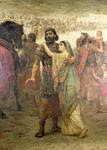I'm off to the Lambeth Conference
On Saturday I go the Lambeth Conference, and I’m really looking forward to it. I’m attending as the representative of the Baptist World Alliance for the first week, and I will hand over to Paul Beasley-Murray for the second week. The Baptist World Alliance is a fellowship of 214 Baptist conventions and unions comprising a membership of 36 million baptized believers and a community of 105 million. I can’t imagine that too many of them will know that Paul and I am representing them, but actually I count it as a great privilege.
The Lambeth Conference takes place every ten years and is the assembly of the bishops of the worldwide Anglican Communion convened by the Archbishop of Canterbury. It’s been happening since 1867.
One thing I don’t expect it to be is boring. The issues that are being addressed and some of the developments in the Anglican Communion over the last few weeks mean that the media are already giving it considerable coverage. Bishop Alan, one of my Anglican colleagues, has already contributed a number of stimulating posts on it. His blog on Indaba makes some helpful comments on what will be a significant part of the process.
As the Anglican Communion is an international association of national churches and not a governing body, the Lambeth Conference serves a collaborative and consultative function. It expresses 'the mind of the communion' on issues of the day. Resolutions which a Lambeth Conference may pass are without legal effect, but they can carry some clout all the same.
It’s fascinating to look back at some of the outcomes. In 1920, among other things, the Lambeth Conference rejected Christian Science, spiritualism, and theosophy, and affirmed the place of women as lay members of synods. It rejected without compromise or qualification all forms of artificial contraception, even within marriage.
In 1930 the Lambeth Conference rejected war as a means of settling international disputes, declared induced abortion ‘abhorrent’ and opposed racial segregation in churches. Interestingly, it approved the use of birth control in limited circumstances. Moving on to 1957 it called for respect for the ‘consciences’ of married couples who use birth control.
These were major issues of the day to which the Anglican communion was seeking to respond. The issues have moved on. It’ll be fascinating to see what the outcomes are in 2008.
The Lambeth Conference takes place every ten years and is the assembly of the bishops of the worldwide Anglican Communion convened by the Archbishop of Canterbury. It’s been happening since 1867.
One thing I don’t expect it to be is boring. The issues that are being addressed and some of the developments in the Anglican Communion over the last few weeks mean that the media are already giving it considerable coverage. Bishop Alan, one of my Anglican colleagues, has already contributed a number of stimulating posts on it. His blog on Indaba makes some helpful comments on what will be a significant part of the process.
As the Anglican Communion is an international association of national churches and not a governing body, the Lambeth Conference serves a collaborative and consultative function. It expresses 'the mind of the communion' on issues of the day. Resolutions which a Lambeth Conference may pass are without legal effect, but they can carry some clout all the same.
It’s fascinating to look back at some of the outcomes. In 1920, among other things, the Lambeth Conference rejected Christian Science, spiritualism, and theosophy, and affirmed the place of women as lay members of synods. It rejected without compromise or qualification all forms of artificial contraception, even within marriage.
In 1930 the Lambeth Conference rejected war as a means of settling international disputes, declared induced abortion ‘abhorrent’ and opposed racial segregation in churches. Interestingly, it approved the use of birth control in limited circumstances. Moving on to 1957 it called for respect for the ‘consciences’ of married couples who use birth control.
These were major issues of the day to which the Anglican communion was seeking to respond. The issues have moved on. It’ll be fascinating to see what the outcomes are in 2008.


Comments
However one feels about the topics discussed I cant understand how anyone can expect any sorta reforms if none of the parties aggree to actually meet and talk.
So now I guess they either press on without that third, or wait another decade.